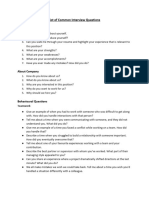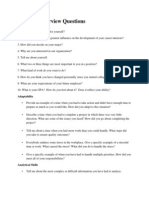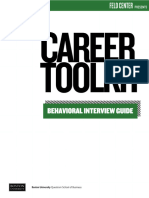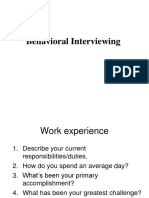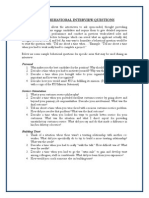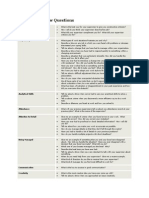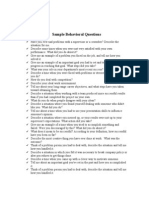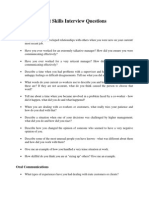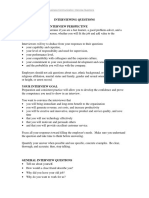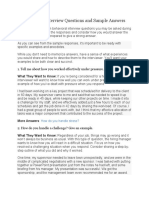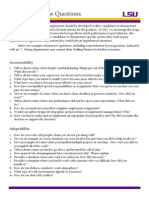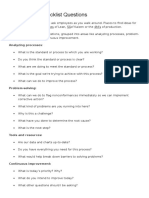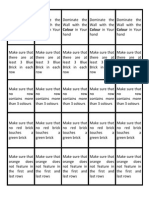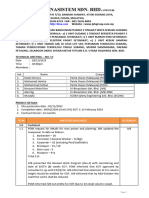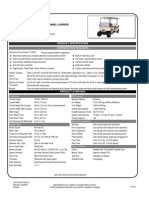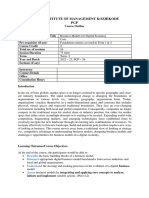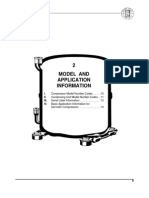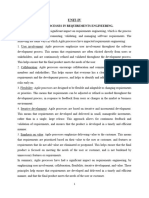Common Behavioural Interview Questions
Teamwork
Interviewers want to know how you interact with others, whether the role calls for working directly
with coworkers, clients, customers, or key stakeholders. As you answer, stick to using “I”
statements and share how you contributed to a successful team.
Common teamwork questions:
• Share a time you had to collaborate with others who have different personalities than yours.
• Share details about the best presentation you ever gave. What made it so good?
• Tell me about when you felt like you were a strong, successful leader.
� • Can you give me an example of a time you faced conflict while working on a team? How did
you handle/manage that situation and still fulfill your responsibilities?
• Describe a time when you had to collaborate with a team member in another department in
your company. How did you overcome the differences in department goals?
• We all make mistakes in communication. Tell me about a time you wish you’d handled
communicating with a member of your team differently.
• Tell me about a time when you had to collaborate with a member of your team who was not
responsive. How did you handle that situation? Were you able to fulfill your responsibilities
and hit your goals?
• Share a time when you needed information from a coworker who wasn’t responsive. What
did you do?
• Describe when you worked as part of a team on a project. Explain your role and how you
contributed.
• How did you handle a time when team members disagreed with you?
• Describe when you and your team members had to compromise on an issue. What were the
results?
• Give an example of when you had to work with someone who was difficult to get along with.
How did you handle interactions with that person?"
• When was the last occasion you asked for direct feedback from a superior? Why?
Time management
Employers are likely to ask questions about time management to better understand how you
handle various responsibilities, prioritize tasks, and delegate work to meet deadlines and goals. As
you respond, consider how you go about your to-do list and highlight how you stay organized at
work.
Common time management questions:
• Tell me about a goal that you accomplished and how you achieved it.
2
� • Tell me about the last time a workday ended before you were able to get everything on your
to-do list done.
• Share an example of when you had to juggle multiple responsibilities at once and how you
prioritized your time.
• How do you estimate how long it will take to complete a task or project?
• Describe a long-term project that you kept on track. How did you keep everything moving?
• Describe a time when you had to be very organized and strategic with your responsibilities
to meet all of your top priorities.
• Give me an example of a long-term project that you managed. What did you do to maintain
progress and meet the timeframe of the project without wasting time?
• Give me an example of a long-term project with multiple stakeholders. How did you manage
everyone’s time and tasks to ensure deliverables were consistently met?
• It’s not always possible to get everything on your task list complete in a single day. Describe
a time when your responsibilities became overwhelming. What did you do?
• Describe a time when you had multiple projects with conflicting deadlines. Were you able to
juggle these projects to meet their deadlines? What sacrifices did you make to ensure you
were successful?
Adaptability
Things can change with very little notice, and employers want to find how you adjust. The goal
when answering these questions is to demonstrate growth and share specific examples you’ve
dealt with in the past.
Common adaptability questions:
• Tell me about a time you had to learn something new quickly.
• Can you share a time when you had to be flexible or adaptable?
• Share details about a time you had to be creative to find a solution to a problem.
3
� • Share more about how you work under pressure.
• Describe a time when you made a mistake or overlooked a solution to a problem. What did
you learn?
• Tell me about settling in to your last job. What did you do to learn the ropes during the first
few days?
• Share a time when you had to embrace new technology, processes, or thinking that was a
major departure from the previous way things were done.
• Tell me about a time you were assigned a task outside of your everyday responsibilities.
How did you handle the assignment?
• Tell me about a time at work when you were under a lot of pressure. What was going on?
How did you handle that pressure?
• Describe a time when you were working on a project, only to have management or some
other factors change the requirements suddenly. What did you do to ensure you met the
new timelines and requirements?
• Tell me about a time when a deadline suddenly changed to much sooner than expected.
What did you do to ensure you met the new timeframe?
• Describe a time when your team was going through a significant change. What was this
change and how did you adapt to meet the changing environment?
• Tell me about a time when a project you were responsible for didn’t go as planned. How did
you deal with the situation?
Communication
Your ability to communicate with others says a lot about who you are in your professional career.
In the interview, discuss your communication skills with the recruiter and share details about times
you had to communicate both verbally and in writing. Employers want to make sure you can
effectively communicate with others, so be ready to answer questions about how you are as a
communicator.
Common communication questions:
• Tell me about a time when you had to say no.
4
� • Give me an example of when you had to manage up.
• Share with me a time you had to build rapport with a coworker, client, or customer who had
a different personality than yours.
• Share a time when you had to persuade someone at work to see your point of view. Was
the outcome positive?
• Can you share a time when you had to deliver bad news to someone? How did you prepare
and what was the outcome?
• Tell me about a time when you were the expert in your field and needed to describe a
project/situation/challenge. How did you handle this and ensure all stakeholders understood
your perspective and what you were describing?
• Describe a time when you had to rely on written communication to initiate a project. How did
you communicate to ensure your ideas came across to your team and they understood all
deliverables?
• Tell me about a time you had to persuade a co-worker or manager. What did you do to
persuade them to see things your way?
• Give me an example of a successful presentation you gave. How did you prepare and
explain everything to ensure it was successful?
Overcoming challenges
Employers will ask how you’ve overcome various challenges in the workplace to understand your
level of perseverance. The goal here is to find out how you manage yourself in stressful situations,
so answer these questions by telling a personal story about a specific instance. It’s best not to be
too general with these answers, but instead, share what you learned or what you’d do differently
next time.
Common questions about overcoming challenges:
• Tell me about a time when you handled a difficult situation.
• Tell me about a time when you made a mistake. What would you have done differently?
5
� • Can you share details about a time when you had to make an unpopular decision and how
you were able to implement it?
• Tell me about a goal you failed to achieve.
• Share with me a time you went above and beyond, for yourself or for others.
• Describe a time you presented a new idea to management, but there wasn’t buy-in. What
did you do next? Were you able to change their minds?
Motivation, ethics, integrity, and values
An employer wants to understand what motivated you, what your values are, and learn more about
your ethics and levels of integrity. This helps them know what you’re passionate about, what
excites you, and how you stay focused. How you answer will tell them if you’re a good match for
the company’s culture, mission, and style of work.
Common questions about motivation, ethics, integrity, and values:
• Provide an example of how you set goals.
• What is your proudest professional achievement? Why is this meaningful to you?
• Was there ever a time when a client, customer, or teammate questioned your honesty? How
did you react?
• Share a time when it was difficult to be honest because of a particular situation. What was
your thought process?
• Have you ever had to follow a rule you didn’t agree with? Why did you follow it? How did it
make you feel?
• Share a time when a coworker was doing something wrong and what you did about it.
• Tell me about the professional accomplishment that you’re most proud of. What was it and
what sets it apart?
• Give me an example of a time when you saw a problem at work. What steps did you take to
correct the issue?
6
� • Tell me about a time when you worked under close supervision and under loose
supervision. How did you handle each of those situations?
• Describe a time where you weren’t happy with your work. What did you do? What could
have made it better?
• Describe a time where you had complete control over a task/project at work. What did you
like/dislike about this? What was the result?
• Tell me about a time when you had to prioritize your work over helping a teammate. What
went into your decision-making process to choose yourself over them?
• Describe a time when a team member came to you with a problem that required your help.
What did you do?
Conflict resolution
No matter what type of job you’re interviewing for, there’s bound to be tension. As you answer
these questions, highlight a situation where you took the lead to resolve a conflict – but avoid
painting the other person negatively. The goal here is to show how you can handle an issue with
someone and reach an understanding professionally.
Common conflict resolution questions:
• Tell me about a time when you disagreed with your manager or supervisor.
• Share a time when you had to stand up for something you believed in.
• Tell me about a time when you had a conflict with a peer or coworker and how the situation
was resolved.
• Was there a time when you wished you would have handled a situation with a coworker
differently?
Growth potential
During a job interview, be ready to discuss past work experience that deals with growth potential.
An interviewer will want to know how you’ve grown in your role and the goals you have for your
future.
7
�Common growth potential questions:
• When was the last time you asked for direct feedback from your manager, and why?
• Describe a time your manager wasn’t around and a problem developed. How did you
handle it and what were the results?
• What is the biggest career goal you’ve achieved recently?
• Have you ever been passed up for a promotion?
Customer Service Questions:
• Describe a time when it was especially important to make a good impression on a client.
How did you go about doing so?
• Give me an example of a time when you didn’t meet a client’s expectation. What happened,
and how did you attempt to rectify the situation?
• Tell me about a time when you made sure a customer was pleased with your service.
• Describe a time when you had to interact with a difficult client or customer. What was the
situation, and how did you handle it?
• When you’re working with a large number of customers, it’s tricky to deliver excellent service
to them all. How do you go about prioritizing your customers’ needs
More Behavioral Interview Questions
• Give me an example of a time when you had to keep from speaking or making a decision
because you did not have enough information.
• Describe a time when you had to make a quick decision.
• What is the toughest group that you have had to get cooperation from? How did you win
them over?
• Have you ever had difficulty getting others to accept your ideas? What was your approach?
Did it work?
• Give me an example of a time when you went above and beyond the call of duty.
• Describe a situation when you were able to have a positive influence on the action of others.
8
� • Tell me about a situation when you had to speak up (be assertive) in order to get a point
across that was important to you.
• Have you ever had to “sell” an idea to your co-workers or group? How did you do it? Did
they “buy” it?
• What have you done in the past to contribute toward a teamwork environment?
• How do you decide what gets top priority when scheduling your time?
• What do you do when your schedule is suddenly interrupted? Give an example.
• Give me an example of an important goal which you had set in the past and tell me about
your success in reaching it.
How to Prepare Questions for a Behavioral Interview
Companies that employ behavioral interviewing techniques can use the same analysis they use to
develop the job description. This helps determine the skill sets required to be successful in the job.
The hiring manager should consider the following questions:
What are the necessary skills to do this job?
And what makes a successful candidate?
Identify the deliverables we are expecting.
What would make an unsuccessful candidate?
Why have people left this position?
What is the most difficult part of this job?
A sample list of skills resulting from the job analysis may include the following:
Decision making and problem solving
Leadership, motivation
Ability to work independently with little supervision
9
�Communication, interpersonal skills
Planning and organization, critical thinking skills
Team building and the ability to influence others
10




